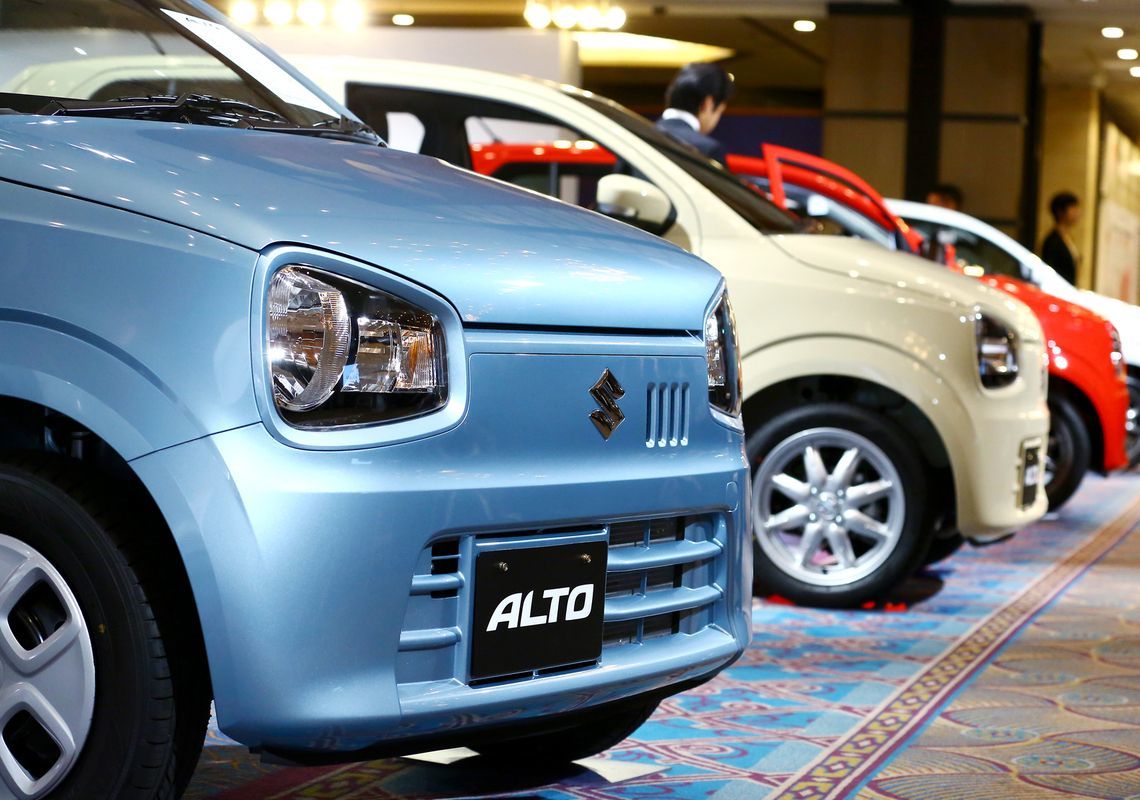
Major K-car (light motor vehicle) manufacturer Suzuki Motor announced its FY 2015 first-quarter results on August 3. They reported an 8.2% increase (55.1 billion yen) in operating profits compared with the previous fiscal year, which represents a new record for the company.
During the press conference that same day, Director Masahiko Nagao pointed out that "income and profit increases at Maruti Suzuki, our subsidiary in India, accounts for a majority of this growth. If we examine performance at group companies other than Maruti, however, things begin to look grim," summing up Suzuki's current dependence on Indian business.
This dependence can be seen clearly in Q1 sales results: consumer backlash following the tax hike on K-cars in resulted in an approximate 17.2% sales-volume decline (152,000 vehicles) in Japan, 31.6% decline (46,000 vehicles) in China and 20.2% decline (32,000 vehicles) in Indonesia.
India, on the other hand, saw a major 13.0% surge (306,000 vehicles) in sales, and with 688,000 four-wheeled units sold in total the company managed to maintain the same figures as the previous term.
Maruti Suzuki, of which Suzuki has a 56% controlling interest, accounts for a 45% market share in India, making them the market leaders. With their 11% rise in sales (1.17 million vehicles) in FY 2014 compared with the previous period and the boost provided by India's growing market, Maruti has nearly doubled its sales in under a decade.
While maintaining its focus on low-priced compact cars, the company has bolstered profits through increased vehicle sales to achieve first-quarter net earnings of 11.9 billion Indian rupees, representing a 56% gain compared with same quarter of the previous fiscal year. The depreciation of the rupee in international money markets has also helped Suzuki's performance in India provide a greater boost to group business results as a whole.
Despite the continually-growing Maruti's increasing contributions to overall Suzuki Group profitability, shareholders' equity due to the 44% of the company owned by minority shareholders is deducted from consolidated returns, which inevitably leaves a broad gap between net income and overall income as shown in financial reports (the latter representing a combination of operating income, ordinary income and so forth).
This coupled with lackluster performance in locations outside of Japan and India has, despite first-quarter operating profit growth, led to a 15.5% drop in net income (31.7 billion yen)--the first such downturn in six quarters.
Moving forward, Suzuki intends to bolster domestic business while, according to Nagao, "laying the groundwork for enhanced operations in Indonesia and Thailand" in ASEAN countries, which are considered by Representative Director and President (COO) Toshihiro Suzuki to be the "third pillar of our business after Japan and India."
In addition, CEO Daniel Loeb of American hedge fund Third Point sent letters out to investors on July 31 notifying them of the fund's investment in Suzuki. Known by many as an outspoken and active shareholder, Third Point has invested in Japanese companies such as Sony Corporation and Fanuc Corporation, calling for these organizations to pursue various improvements including strengthening of returns to shareholders and restructuring of business operations.
Delicate Situation
Third Point has cited Suzuki's 56% stake in Maruti as the corporate group's most valuable asset, praising Maruti's growth potential and high competitive strength in the Indian market but asserting that the value of the group's Indian business including Maruti is not reflected in Suzuki's market capitalization.
In the fund's letter to investors, they stated that the failure of the capital tie-up between Suzuki and Germany's Volkswagen (VW) has lowered the former's enterprise value, and that Suzuki should resolve this matter in order to enable further expansion of its business in India.
For the time being, Third Point has put forth no specific demand or proposal regarding Suzuki; rather, they have simply explained to their investors the relatively cheap price of Suzuki stock. On August 3, the day on which the fund announced its investment, the value of Suzuki shares rose by 3.4% amid declining stock prices at other automotive companies.
This rise in stock prices has created a rather delicate situation: if Suzuki's contentious "divorce" with VW is finalized, Suzuki intends to buy back the 20% of shares owned by VW; however, rising stock prices would increase the financial burden of buying these shares back. VW initially invested 228.9 billion yen to acquire Suzuki shares, and buying them back at current prices would come with a hefty 500 billion yen price tag.
Furthermore, the recent interest in Suzuki by Third Point, a fund that could sell off its shares at any time, has raised former's popularity on the stock market--a situation that Suzuki does not welcome in the least.
